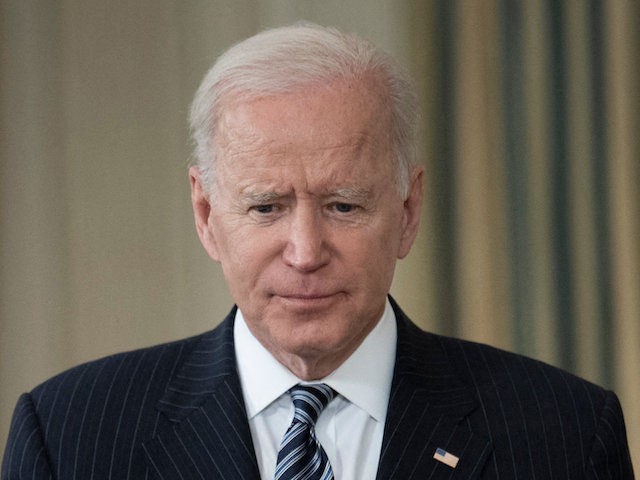The Guatemalan government denied any signed deal as part of a “commitment” touted by the Biden administration Monday to deploy hundreds of police and military personnel to its southern border with Honduras to stem the surge of migrants heading to the U.S. southern border.
Honduras added it is exploring deploying more soldiers on its border with Guatemala. Still, it has not decided yet, stressing there is “no commitment” to deploy soldiers to the border despite its desire to prevent its nationals from making the potentially deadly journey north.
White House Press Secretary Jen Psaki and Special Assistant to the President for Immigration for the Domestic Policy Council Tyler Moran touted a multinational “commitment” by Mexico, Honduras, and Guatemala on Monday to boost their border guards.
“I think the objective is to make it more difficult to make the journey and make crossing the borders more — more difficult,” she said of the alleged commitments.
However, it appears the Biden administration may have jumped the gun on announcing it had received “commitments” from Mexico and the two Central American countries to deploy more border guards to help deal with the influx of migrants heading to the U.S.
On the same day the White House made their announcement, the governments of Guatemala and Honduras did not appear devoted to the arrangement announced by the White House, the Associated Press (AP) reported.
Guatemala said it had decided to deploy immigration authorities on its own. Meanwhile, Honduras added it was just exploring the prospects of sending more police and military personal to its border to prevent people from heading to the U.S.
Mexico said it was maintaining the same number of troops on its southern border. The Latin American nations’ comments suggested the alleged “commitments” had not changed much.
Guatemalan presidential spokeswoman Patricia Letona declared:
The Guatemalan government has undertaken protection and security actions at the border since last year, on its own initiative, it is a constitutional mandate. In the context of the pandemic, the protection of the borders has become a fundamental aim for the containment of the virus.
Really interesting. Guatemala says that it has NOT signed any kind of agreement with the United States on border security, but says they "maintain their commitment to fortifying border security."
h/t @GreciaOrtzJR https://t.co/5nwgMchxWZ
— Aaron Reichlin-Melnick (@ReichlinMelnick) April 13, 2021
Letona’s comments came after Psaki told reporters, “Guatemala surged 1,500 police and military personnel to its southern border with Honduras and agreed to set up 12 checkpoints along the migratory route.”
Over the last few years, Guatemalan troops have broken up the last several attempted migrant caravans at its northern border with Mexico.
Psaki refused to say what role Vice President Kamala Harris played on the alleged “commitments” announced Monday, only saying the discussions happened on several levels.
Harris talked to Guatemalan President Alejandro Giammattei at the end of March, but apparently, she failed to convince him to sign a deal to deploy more border authorities.
Honduras Foreign Affairs Minister Lisandro Rosales noted on Monday that Honduras already maintains a multinational force at its border with Guatemala that works closely with that government on combating illegal immigration, organized crime, and other cross-border illegal activity.
But “there was no commitment on the part of the Honduran delegation to put soldiers on the border, even though there is a clear commitment by the Honduran government to avoid this kind of migration that generates death and mourning for Honduran families,” Rosales added.
Nevertheless, Honduras Defense Secretary Fredy Santiago Díaz Zelaya acknowledged later that the military was exploring the possibility of deploying more troops to its border with Guatemala to help deal with migration control.
The military always operates under a plan, and that planning would determine how many troops, if any, would assist national police and immigration authorities at the Honduras-Guatemala border.
“We need to do a correct analysis of the situation, increase troops if it’s necessary,” Díaz Zelaya told local press. He said Honduras would do so “in response to this request that comes from the great nation to the north [the United States] to be able to help on the issue of immigration.”
“Honduras surged 7,000 police and military to disperse a large contingent of migrants,” Psaki said of the alleged “commitment.”
Echoing Psaki, Mexico’s government stressed it would make no changes to the number of troops deployed on its southern border with Guatemala.
“Mexico will maintain the existing deployment of federal forces in its border area, with the objective of enforcing its own immigration legislation, to attend to migrants, mainly unaccompanied minors, and to combat the trafficking of people,” Mexico’s Foreign Affairs ministry proclaimed Monday.
“Mexico made the decision to maintain 10,000 troops at its southern border, resulting in twice as many daily migrant interdictions,” Psaki said.
Since former U.S. President Donald Trump threatened tariffs on Mexican imports in 2019, Mexico has maintained more personnel at its southern border.
President Joe Biden has refused to pressure Mexico to serve as a crucial buffer zone between Central America and the United States.
The Washington Post reported Sunday that Mexico is restricting the number of migrant families it will take back from the U.S., forcing the Biden administration to accept most of them.
Mexico’s pushback would further complicate the Biden administration’s efforts to deal with what the federal government predicts could be a giant wave of migrants to the U.S.-Mexico border in 20 years.
Regarding the Biden administration's new agreement with Mexico for troops: (pssst! the Mexican gov is handing out "flash-passes" to immigrants who just show them at the checkpoints and get waved through!! pssst!) https://t.co/CacZ5Wehlo
— Todd Bensman (@BensmanTodd) April 13, 2021
On Tuesday, Todd Bensman, a fellow at the Center of Immigration Studies (CIS), noted via Twitter, “Regarding the Biden administration’s new agreement with Mexico for troops: (pssst! the Mexican gov is handing out “flash-passes” to immigrants who just show them at the checkpoints and get waved through!! pssst!)

COMMENTS
Please let us know if you're having issues with commenting.